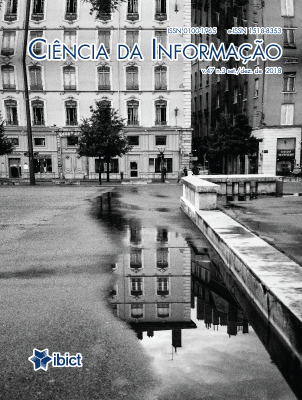Wittgenstein e o significado dos nomes na Web Semântica
DOI:
https://doi.org/10.18225/ci.inf.v47i3.4153Keywords:
Web semântica, Identificador Uniforme de Recursos, URI, Wittgenstein, Teoria da linguagemAbstract
As Uniform Resource Identifi ers (URI) foram criadas para nomear ou identificar recursos na Web. Todo recurso possui uma URI que o referencia sem ambiguidade. Mas o que significa uma URI no contexto da Web Semântica? Sobre isso, um embate foi estabelecido entre Tim Berners-Lee – o criador da Web – e Patrick Hayes – lógico que formalizou a Web Semântica. Para Berners-Lee, uma URI representa uma “coisa” do mundo real na Web, denotando-a sem ambiguidade; já Hayes afirma que uma URI somente pode descrever uma “coisa” do mundo real, mas nunca denotá-la sem ambiguidade. Percebe-se aí um embate teórico no âmbito da filosofia da linguagem, e o objetivo do artigo é explorar possíveis ligações entre postulados de Ludwig Wittgenstein sobre a linguagem e a Web Semântica por meio de pesquisa bibliográfica e revisão de literatura. Além de trazer à luz o mencionado embate, como resultado da pesquisa sugere-se que postulados de Wittgenstein e motores de busca da Web aplicados a repositórios de ontologias podem, em conjunto, fundamentar avanços na Web Semântica que são dependentes de melhor entendimento sobre o significado das URIs.Downloads
References
ALLEMANG, D.; HENDLER, J. Semantic web for the working ontologist: effective modeling in RDFs and OWL. Cambridge, MA: Elsevier, 2008.
BERNERS-LEE, T. The Semantic Web. In: Scientific American Magazine, 2001.
BERNERS-LEE, T. Meaning of URIs in RDF documents. 2003. Disponível em: . Acesso em: 19 out. 2017.
BERNERS-LEE, T. et al. Uniform Resource Identifier (URI): Generic syntax. 2005. Disponível em: <https://www.ietf.org/rfc/rfc3986.txt>. Acesso em: 19 out. 2017.
CONDÉ, M.L.L. Maquiavel e Wittgenstein: a astúcia da linguagem. Caderno de Filosofia e Ciências Humanas. Belo Horizonte, v.1, n.1, p.5-11, 1993.
CONDÉ, M.L.L. Wittgenstein linguagem e mundo. São Paulo: Annablume, 1998.
EIS, D. Introdução à Web Semântica: a inteligência da informação. São Paulo: Casa do Código, 2017.
GRACIOSO, L.S.; SALDANHA, G.S. Ciência da informação e filosofia da linguagem: da pragmática informacional à web pragmática. Araraquara: Junqueira&Marin, 2011.
HALPIN, H. Social meaning on the web: from Wittgenstein to search engines. IEEE Xplore Digital Library, v.24, p.27-31, 2009.
HALPIN, H. Sense and reference on the web. Minds & Machines, v.21, p.153-178, 2011.
HALPIN, H.; LAVERENKO, V. Relevance feedback between hypertext and semantic search. In: Proceedings of Semantic Search Workshop at the World Wide Web Conference, 2009.
HAYES, P. Meaning of URIs in RDF documents. 2003a. Disponível em: <http://lists.w3.org/Archives/Public/www-tag/2003Jul/0147.html>. Acesso em: 19 out. 2017.
HAYES, P. Meaning of URIs in RDF documents. 2003b. Disponível em: . Acesso em: 19 out. 2017.
HAYES, P.; HALPIN, H. In defense of ambiguity. International Journal on Semantic Web and Information Systems (IJSWIS), v.4, n.2, p.1-18, 2008.
JANIK, A.; TOULMIN, S. A Viena de Wittgenstein. São Paulo: Editora Campus, 1991.
LUNTLEY, M. Contemporary philosophy of thought. London, UK: Blackwell, 1999.
MARQUES, E. Putnam e a possibilidade de determinação de essências a partir de critérios semânticos. Síntese, Belo Horizonte, v.26, n.84, 1999.
MIGUENS, S. Filosofia da linguagem: uma introdução. Porto: SerSilito-Empresa Gráfica, Lda., 2007.
PEARS, D.F. As ideias de Wittgenstein. São Paulo: Cultrix, 1973.
PUTNAM, H. The meaning of meaning. In: GUNDERSON, K. (ed.) Language, mind, and knowledge. Minneapolis, MN: University of Minnesota Press, 1975.
RUSSELL, B. Introdução. In: WITTGENSTEIN, L. Tratado lógico-filosófico: investigações filosóficas. 3.ed. Lisboa: Fundação Calouste Gulbenkian. 2002.
THE CAMBRIDGE WITTGENSTEIN ARCHIVE. Disponível em: <http://www.wittgen-cam.ac.uk/>. Acesso em: 19 out. 2017.
WITTGENSTEIN, L. Investigações Filosóficas. 3. ed. São Paulo: Abril Cultural, 1984.
WITTGENSTEIN, L. Tratado lógico-filosófico; Investigações filosóficas. 3.ed. Lisboa: Fundação Calouste Gulbenkian. 2002.
Downloads
Published
Issue
Section
License
- This publication reserves the right to modify the original, regarding norms, spelling and grammar, in order to maintain the standards of the language, still respecting author writing style;
- The final proofs will not be sent to the authors;
- Published works become Ciência da Informação's property, their second partial or full print being subject to expressed authorization by IBICT's Director;
- The original source of publicaton must be provided at all times;
- The authors are solely responsible fo the views expressed within the article;
- Each author will receive two hard copies of the issue, if made availalbe in print.




























